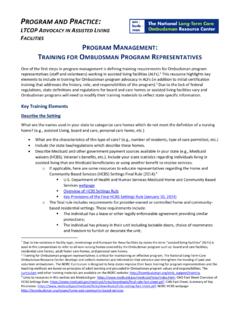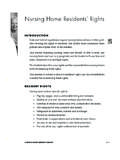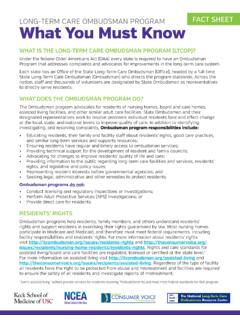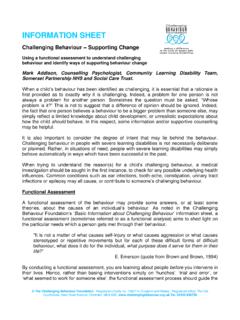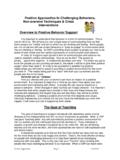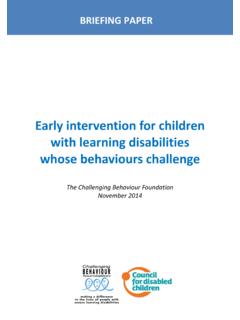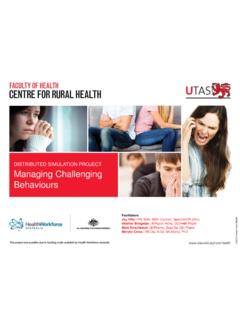Transcription of Working with Families - ltcombudsman.org
1 Working with Families : TIPS FOR EFFECTIVE COMMUNICATION AND STRATEGIES FOR challenging SITUATIONS ROBYN GRANT, MSW AMITY OVERALL-LAIB, MA NATIONAL LONG-TERM CARE OMBUDSMAN CENTER NATIONAL CONSUMER VOICE FOR QUALITY LONG-TERM CARE 1001 CONNECTICUT AVE, NW, SUITE 425 WASHINGTON, DC 20036 PHONE: 202-332-2275 EMAIL: The National Long-Term Care Ombudsman Resource Center (NORC) is a program of the National Consumer Voice for Quality Long-Term Care (the Consumer Voice ), funded by a grant from the Administration on Aging (AoA), Administration for Community Living (ACL), Department of Health and Human Services (HHS). Grantees undertaking projects under government sponsorship are encouraged to express freely their findings and conclusions. Points of view or opinions do not, therefore, necessarily represent official Administration on Aging policy. 2 Working with Families : Tips for Effective Communication and Strategies for challenging Situations I.
2 INTRODUCTION The goal of this paper is to assist ombudsmen in Working with Families or legal representatives.* Ombudsmen work with Families in a variety of ways. An ombudsman may help a family member with self-advocacy or respond to a complaint from a family member, depending on the resident s wishes. Since the resident is always the ombudsman s client, the role of the ombudsman can perhaps be best described as Working for residents and Working with Families . This paper is designed to provide tips, resources and strategies to help ombudsmen improve their skills in Working with Families . It reviews key communication techniques that are important for ombudsmen in their interactions with and communicating their role to Families . The paper also presents a range of materials for ombudsmen to use to help family members enrich their communication skills related to problem solving, inform them about their rights and the facility s responsibilities, and teach them how to self-advocate.
3 Additionally, this paper provides examples of challenging situations and strategies for assisting Families during those situations. *The term family member is used in this paper; however, these communication techniques, advocacy tips and resources are also applicable when Ombudsmen work with a resident s legal representative. II. IMPORTANCE OF Working with Families There are several reasons why ombudsman work with Families is critical. When a resident is incapable of making decisions and a family member is the legal surrogate and complainant, the ombudsman needs the consent and guidance of the family member in order to move forward. Aside from Working with Families for legal reasons, an ombudsman can gain valuable and helpful insight and information from family members. Relatives can have a lifelong knowledge of the resident her values, preferences, social history, concerns, what s important to her, significant events in her life, and more.
4 Families can share important observations and make useful suggestions based on their experience with the resident. In some cases, such information can shed light on what s causing a problem and assist in crafting a solution, particularly when the resident is unable to communicate on her own behalf. As well as learning from family members, one ombudsman noted that learning about family members can be helpful too. She reported that knowing about a family, such as the roles family members play and family dynamics can help the ombudsman better understand the resident and the situation. She added, to serve residents well, you need to know about their family. In some instances, it is important for ombudsmen to work with Families because the resident needs or wants family support. For example, a resident may not feel comfortable taking action without encouragement or support from key family members.
5 In other situations, concrete steps and actions by family members are needed, such as a daughter agreeing to call the resident every day at a certain time to calm the resident when she becomes agitated or family assisting a resident who is transitioning from the nursing home into the community. Making sure that family is involved may be essential for complaint resolution on behalf of a resident. 3 Working with Families : Tips for Effective Communication and Strategies for challenging Situations Taking the time to educate and empower family members allows Families to address problems on their own, thus needing less assistance from the ombudsman. One ombudsman said that Working with Families on self-advocacy makes the ombudsman s job easier and gives an ombudsman more time to help other residents who don t have family to advocate for them. Additionally, when Families view the Long-Term Care Ombudsman Program (LTCOP) as a helpful resource they may promote the LTCOP within the facility and the community and share the tips and information they receive from the program with other family members with similar concerns.
6 III. COMMUNICATION Strong communication skills are the foundation of ombudsman work and are vital to ombudsman success. What an ombudsman says and how he or she says it influences all aspects of ombudsman work, especially when addressing complaints. The Overview of Key Communication Techniques document in the appendix highlights the basic elements of communication addressed in the National Long-Term Care Ombudsman Center (NORC) Curriculum and provides other important communication techniques. Good communication is equally important for family members. The ability to communicate well can build positive relationships with staff that translate into good care for a loved one. Strong communication skills are particularly important during problem resolution, because poor communication can result in an adversarial relationship that increases conflict instead of Working together to resolve a situation.
7 Ombudsman Communication with Families Speaking with Families for the first time By the time family members contact the ombudsman, it is likely that they have been dealing with concerns related to their loved one for some time and may be frustrated. Before ombudsmen can begin processing a complaint, they need to give the family member time to tell their story and express their feelings. Ombudsmen are often the first person who really listens to what a family member is saying. Below are some approaches that allow the ombudsman to acknowledge a family member s feelings before seeking the information necessary to handle a complaint. These approaches may help defuse an emotionally charged situation to enable everyone to focus on the issues. They also indicate that the ombudsman has heard (listened to) the family member s concerns and feelings. It sounds like you care a lot about your aunt.
8 It must be very upsetting to find her with food all over her face and clothes when you come in to visit. So what I m hearing is that you are frustrated that the nursing home administrator has not addressed the problems that you have taken to him on several occasions. Is that right? It sounds like you have tried everything you can think of and done the best you can, but your mother is still not getting the help she needs at meals. That must be so frustrating for you. Let s see what we can do to try to make things better. 4 Working with Families : Tips for Effective Communication and Strategies for challenging Situations Other important points to address during the first conversation with Families include: Discuss the role of the ombudsman (see next section), including that the ombudsman will ultimately take direction from the resident. Ask family members what they want the outcome to be.
9 This can provide the ombudsman with important information about the motivation of the person. For instance, if a son s goal is to get the administrator fired, the case is not about the resident. Be clear about what you can and cannot do. One ombudsman says, We re going to try to work through this, but sometimes there are situations that go beyond my scope. For example, if there is a nursing issue where nursing expertise is needed, that would be something the state would have to handle. Explain that with the resident s consent, you will investigate and get back to them as quickly as possible. Communicating the Role of the Ombudsman to Families Most family members have never heard of an ombudsman. When they contact the program, it is generally because someone has told them the ombudsman can help with a problem they have run into in the nursing home or assisted living facility.
10 Since most Families have no idea about ombudsman responsibilities and what ombudsmen can and cannot do, it is critical that ombudsmen give Families a clear understanding of their role right from the very beginning. Ombudsmen should take particular care to explain that the resident is their client. Here are examples of what some ombudsmen say to Families : The resident - your mother- is our client and we re going to do the best we can for her. I am a resident advocate. I am here for your mother and what she needs, and hopefully we can all work together on this. I m in a very unique position. I have the honor of being the trustee of your mother s wishes. It s important that you understand that your mother will guide me in Working this out. QUICK TIP: When speaking with family members that are upset, one ombudsman begins by referring to the resident as or Mrs. _____.
